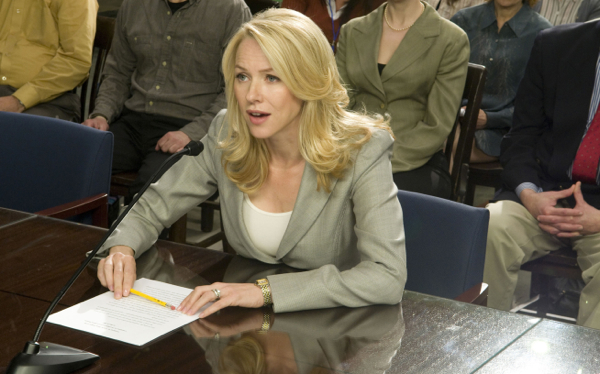Movie review by Greg Carlson
Hollywood mythmaking and recent political chicanery collide in Doug Liman’s fictionalized version of the Valerie Plame scandal in “Fair Game,” based on separate books by Plame and her husband, former ambassador to Gabon and Sao Tome and Principe Joseph C. Wilson. Marked by Liman’s own jittery handheld photography and the inclusion of some tense, action-oriented scenes, “Fair Game” joins a growing roster of films – both fictional narrative and documentary – critical of the George W. Bush administration’s WMD-focused pretext for war in Iraq. Nowhere near as compelling as Charles Ferguson’s “No End in Sight,” “Fair Game” nevertheless manages to communicate several points of outrage and frustration from the perspective of Plame and Wilson.
Strongly played by Naomi Watts and Sean Penn, Plame and Wilson pursue career trajectories that tax their personal time and seem to limit family involvement with their twin children. Well-connected members of the D.C. intelligentsia, Plame and Wilson are shown in early scenes conveying disgust as America prepares for battle with Saddam Hussein. While the movie pivots around the inevitable revelation of Plame’s identity and the stormy fallout, Liman juggles subplots including the domestic deterioration of the protagonists’ marriage, speculation about the involvement of the White House and Karl Rove in the decision to leak Plame’s name, and a family drama revolving around an Iraqi scientist and his U.S.-based sister.
Several writers have questioned the veracity of those scenes in which Plame’s contacts in Iraq appear to be directly compromised and even abandoned as a result of her being outed by Robert Novak in his July 14, 2003 “Washington Post” column titled “Mission to Niger,” but Liman endeavors to connect as many previously documented dots as possible, and thematically the film sticks close to the chain of events surrounding Plame and Wilson’s reaction to Plame’s blown cover. Fall guy/villain I. Lewis “Scooter” Libby (a scene-stealing David Andrews) remains the only government official held legally responsible for disseminating classified information. Libby was convicted of perjury, making false statements to federal investigators, and obstruction of justice.
Even though it remains largely unexplored in the film, the most interesting dimension of “Fair Game” concerns the extent to which Plame’s gender was used as a means to discredit her in the media following Novak’s original “Washington Post” column. Following the bombshell, Plame maintains silence even as her husband books television appearances to defend his position, and Liman shares several of the speculations leveled against Plame during the aftermath of the leak, most intriguingly that Plame somehow simultaneously held no position of real power as a C.I.A. operative but yet could still pull the right strings to get her husband assigned to a 2002 trip to Niger to investigate the possibility of uranium sales to Iraq.
Even though Watts brings tremendous poise to a challenging role that requires secrecy, discretion, and silence, “Fair Game” is more than once thrown off balance by the contrast between the tight-lipped Valerie and Wilson’s blustery verbal pyrotechnics – well-suited to Penn’s off-screen image as a frank debater. A later scene, in which Valerie visits her father (Sam Shepard in a cameo appearance) doesn’t add much to the character’s assessment of the conflict between personal integrity and loyalty to the state, and “Fair Game” concludes with more than a hint that justice was done, even if that premise is hard to swallow.
